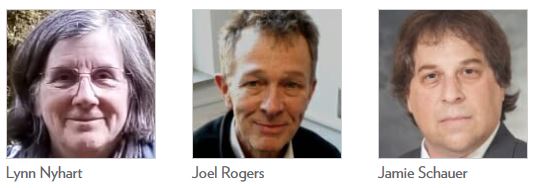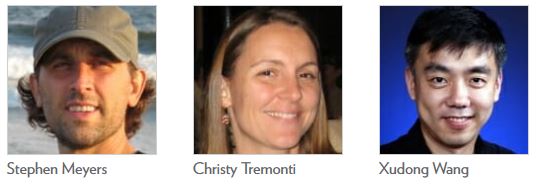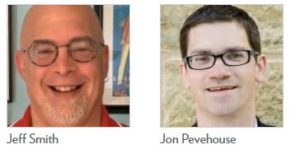5.12.20 | UW-Madison News | Natasha Kassulke | Original Publication
Thirty-two members of the University of Wisconsin-Madison faculty have been awarded faculty fellowships for 2020-21. The awardees span the four divisions on campus: arts and humanities, physical sciences, social sciences and biological sciences.
“During these difficult times, it is a pleasure to be able to recognize our outstanding faculty who every day support the research, teaching, outreach and public service missions of the university,” says Steve Ackerman, vice chancellor for research and graduate education.
The awards are made possible because of the research efforts of UW-Madison faculty and staff. Technology that arises from these efforts is licensed by the Wisconsin Alumni Research Foundation and the income from successful licenses is returned to the Office of the Vice Chancellor for Research and Graduate Education. It’s used to fund research activities throughout the divisions on campus, including these awards.
Eleven faculty are appointed to WARF Named Professorships. The awards, which come with $100,000, honor faculty who have made major contributions to the advancement of knowledge, primarily through their research endeavors, but also as a result of their teaching and service activities. Award recipients choose the names associated with their professorships.
Eleven faculty have received H.I. Romnes Faculty Fellowships, recognizing faculty within their first six years from promotion to a tenured position. The award is named in recognition of the late WARF trustees president H.I. Romnes and comes with $60,000 that may be spent over five years.
Ten faculty have been honored with Kellett Mid-Career Awards to support those who are seven to 20 years past their first promotion to a tenured position. The award was created to provide support and encouragement to faculty at a critical stage of their careers. The honor, named for the late William R. Kellett, a former president of the WARF board of trustees and president of Kimberly-Clark Corporation, comes with $75,000 that may be spent over five years.
WARF NAMED PROFESSORSHIPS

Emery H. Bresnick, Gary Felsenfeld Professor of Cell and Regenerative Biology, is director of UW-Madison Blood Research Program and co-director of the Cancer Genetic/Epigenetic Mechanisms Program of the Carbone Cancer Center. His research led to the discovery of new paradigms of blood stem- and progenitor-cell development and function, as well as human disease diagnostic strategies.
Edwin Chapman, Ricardo Miledi Professor of Neuroscience, is director of the Quantitative Membrane Biophysics Program. He has pioneered methods that have uncovered critical information about the nervous system, especially with respect to how nerves communicate, and his research concerns the molecular mechanisms that help regulate its function. His laboratory also helped identify cellular protein receptors for neurotoxins produced by the clostridial bacteria, including Botox.
Li Chiao-Ping, Sally Banes Professor of Dance, focuses on issues of social justice and equality, pushing the boundaries of traditional dance by working against gender norms and classical techniques. She has developed a highly personal statement and style and an ongoing element of her work is the negotiation of tradition and innovation, which stems from her cultural history and social environment. She is artistic director of Li Chiao-Ping Dance.
Robert Enright, Aristotelian Professorship in Forgiveness Science, studies educational psychology and is a licensed psychologist. He is co-founder of the International Forgiveness Institute, a nonprofit dedicated to sharing knowledge about forgiveness and community renewal through forgiveness. Enright pioneered the scientific study of forgiveness, integrating philosophy, psychology and psychotherapeutic themes into the work. He is often introduced as “the father of forgiveness research.”

Mark Eriksson, John Bardeen Professor of Physics, studies quantum computing, semiconductor quantum dots and nanoscience. With collaborators, he has made fundamental findings with respect to quantum dots, which are semiconducting nanoparticles, and qubits, the basic unit of quantum information. Eriksson currently leads a multi-university team focused on the development of quantum computers built using many of the materials and fabrication methods common to modern, classical integrated circuits.
Anna Huttenlocher, Anna Ruth Brummett Professor of Pediatrics and Medical Microbiology and Immunology, conducts research at the interface of cell biology and immunology. Her recent work centers on understanding innate immune inflammation, how cell migration is regulated during tissue damage and repair, and how it’s altered in human disease. Her lab has pioneered approaches to see cells in motion within live organisms and discovered previously unknown mechanisms underlying inflammation. Huttenlocher is a physician scientist who sees patients with autoimmune diseases and is director of UW-Madison’s Medical Scientist Training Program.
Lea Jacobs, Mae D. Huettig Professor of Communication Arts, is a historian with a strong interest in the production practices and organizational structure of the American film industry, and in the development of film styles and genres. She studies the history of the American studio system, silent film, film melodrama, and the relationship between film style and technology. Jacobs was director of the UW Cinematheque for over a decade and helped run the Wisconsin Film Festival from 2010 to 2013. From 2013 to 2018 she was associate vice chancellor for research in the arts and humanities.
Stacey Lee, Frederick Erickson Professor of Educational Policy Studies, is an educational anthropologist, using anthropological approaches to explore the role of formal and informal education in incorporating immigrant youth into the United States. She was one of the earliest education scholars to offer a critical, socio-cultural analysis of the racialization of Asian American students in U.S. schools. She is currently exploring the way Asian American communities navigate broader racial contexts through their educational advocacy.

Lynn Nyhart, Robert E. Kohler Professor of History of Science, focuses on the history of German biology in the 19th and early 20th centuries, especially the relationships between the development of institutional structures through which science operates — such as universities, zoos, schools, museums, print culture — and the emergence of important intellectual trends in biology. Her current project examines the politics of the life sciences before and after the political revolutions of 1848.
Joel Rogers, Noam Chomsky Professor of Law, Political Science, Public Affairs and Sociology, also directs COWS, a national think-and-do tank on high-road development. He has published widely on democratic theory and practice and developed the influential “high-road” approach to development. This reconciles concerns with social inclusion and material fairness, environmental sustainability and popular accountability. It considers competitive market conditions by using democratic organization to increase the economic efficiency of place and capture and share its benefits locally.
Jamie Schauer, William C. Boyle Professor of Environmental Engineering, is a professor of civil and environmental engineering and director of the Wisconsin State Laboratory of Hygiene. His research focuses on development and application of measurement techniques to understand the sources and impacts of air pollution. Schauer’s research has contributed to numerous efforts around the around the world to mitigate air pollution and identify how controlling air pollution sources can reduce the effects of air pollution of human health.
H.I. ROMNES FACULTY FELLOWSHIPS

Monique Allewaert, associate professor of English, studies 18th century American plantation colonies, especially at the intersections of ecology, race studies and aesthetics. She is completing a book that explores how plantation colonies’ inadvertent proliferation of insects became central to the cultural productions of enslaved, free black, and indigenous stakeholders.
John Bengson, associate professor of philosophy, researches the conceptual foundations of thought and action. He has published extensively on intuition, perception, understanding and practical know-how. He is writing a series of books on the nature of morality, non-theoretical forms of understanding, and philosophical methodology.
Keith Findley, associate professor of law, has been engaged with, studied and taught about the criminal justice system for 35 years. In 1998, he co-founded the Wisconsin Innocence Project and focused his attention on the systemic flaws that contribute to wrongful convictions. Continuing that work, in 2017 he co-founded the Center for Integrity in Forensic Sciences, dedicated to improving the reliability of criminal prosecutions through strengthening forensic sciences.
Holly Gibbs, associate professor of Geography and the Nelson Institute for Environmental Studies, studies how and why people use land around the world, including in the United States and the Brazilian Amazon. Gibbs previously received the Phillip R. Certain – Gary D. Sandefur Letters & Science Distinguished Faculty Award and the Chancellor’s Distinguished Teaching Award.

Victor Goldgel Carballo, associate professor, teaches Latin American literatures and cultures in the Department of Spanish and Portuguese. During the past year, he has been an American Council of Learned Societies fellow at the National Humanities Center, working on a book about race and open secrets in 19th century Cuba.
Melissa Harrison, associate professor of biomolecular chemistry, focuses on understanding the variability in the ways in which the DNA genome is interpreted and how it affects development and disease. Harrison has been named a Vallee Scholar, Basil O’Connor Starter Research Scholar and a Wisconsin Partnership Program New Investigator.
Nam C. Kim, associate professor of anthropology, conducts archaeological research on past societies. With field experience across several countries, he is interested in urbanism, state formation, and forms of violence, warfare, and peacemaking. He authored The Origins of Ancient Vietnam in 2015 and co-authored Emergent Warfare in Our Evolutionary Past in 2018. He has also received recognition for teaching and service efforts.
Hiroshi Maeda, associate professor of botany, investigates how plants make aromatic amino acids, which are essential nutrients in the human diet and the precursors of numerous plant natural products. The Maeda group uncovered evolutionary pathways and other biochemical and genetic information that is currently being used to conduct synthetic biology for the production of various sustainable, plant-based chemicals.

Stephen Meyers, professor of geoscience, conducts research on climate change and Earth history, and teaches geoscience. He established tadada Scientific Lab, which explores new approaches for inspiring scientific literacy and cultivating emotional connections to science, and he has directed international programs for advanced geoscience education. He is also the recipient of a 2017 Vilas Distinguished Achievement Professorship.
Christy Tremonti, associate professor of astronomy, studies how supernovae and black holes help regulate star formation in galaxies. She is an avid user of the Hubble Space Telescope and an enthusiastic instructor who particularly enjoys teaching non-majors about the dark side of the universe: dark matter, dark energy, and black holes.
Xudong Wang, professor of materials science and engineering, studies the growth and assembly of nanostructures. He also works on the development of flexible electronic and biomedical devices that harvest mechanical energy from human activities and the environment. Wang also leads a nanogenerator that enables self-powering function in bioelectronics.
KELLETT MID-CAREER AWARDS

Dominique Brossard, professor and chair of the Department of Life Sciences Communication and an affiliate of the Morgridge Institute for Research, studies the intersection between science, media and policy. She is an internationally known expert in public opinion dynamics related to controversial scientific issues and risk communication. She has published more than 100 research articles in outlets such as Science and Proceedings of the National Academy of Sciences, and has been an expert panelist for the National Academy of Sciences.
Thomas Brunold, professor of chemistry, studies the geometric and electronic properties — and thus the reactivity — of metal centers in proteins and cofactors. He uses a number of physical and computational techniques to study enzymes and synthetic inorganic model complexes.
Paul Campagnola, professor of biomedical engineering and medical physics, studies changes in the extracellular matrix — a collection of molecules that surrounds the cells in tissues and organs — in various forms of cancer, fibrosis and connective tissue disorders. He applies 3D imaging and microfabrication techniques to examine structural features and create models to study these diseases.
Joshua Coon, professor of biomolecular chemistry and Thomas and Margaret Pyle Chair at the Morgridge Institute, develops chemical instruments and methods to study protein structure, regulation and function. His lab uses these technologies to research a wide range of organisms, with implications for bioenergy and human health.

David Lynn, professor of chemical and biological engineering, chemistry and materials science. He designs and synthesizes new types of “soft” organic materials, including polymers, surfactants and more. Lynn and his research group have developed new materials with potential applications in advanced drug delivery and environmental sensing, as well as new approaches to control or prevent the fouling of surfaces by microorganisms.
Marisa Otegui, professor of botany and a member of the Center for Quantitative Cell Imaging, studies how plants use cellular processes to coordinate development and their responses to stress and disease. Her group has discovered fundamental mechanisms that regulate cellular protein and membrane degradation and are essential for plant survival and growth. She has participated in several initiatives to bring new microscopy imaging capabilities to campus and is the director of the 3D Electron Microscopy Center at Bock Laboratories.
Bret Payseur, professor of genetics and medical genetics, studies biological evolution. His research examines the origin of species, species adaptation to novel environments, and mechanisms of reproduction — all from a genetic perspective. He values mentoring of graduate students as a critical part of scientific research and education.
Cherene Sherrard-Johnson, professor of English, is a scholar, poet and essayist who specializies in 19th and 20th century African American and Caribbean literature, visual culture and feminist theory. Her critical books and articles have demonstrated the centrality of black women’s theoretical and artistic practice, especially during the Harlem Renaissance era. Her creative writing and nonfiction explore the nuanced and multifaceted aspects of black life in the diaspora. She is working on a series of essays following in the footsteps of 19th century abolitionist author Mary Prince.

Jeff Smith, professor of film, is the director of the Wisconsin Center for Film and Theater Research. He has written two books on American cinema and is co-author of the 11th and 12th editions of “Film Art: An Introduction.” Smith teaches courses on film theory, film sound and contemporary Hollywood and does video essays for the Criterion Channel’s “Observations on Film Art” series.
Jon Pevehouse, professor of political science, studies international relations and political methodology. He has received several teaching awards, including the Chancellor’s Distinguished Teaching Award. He is the recipient of the international Karl Deutsch Award, given to the scholar under age 40 who has made the most significant contribution to the study of international relations. He has also served as the editor of the leading professional journal in the field, International Organization.